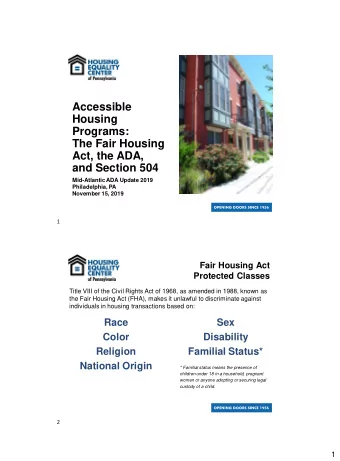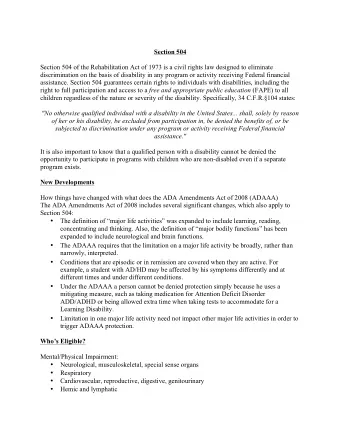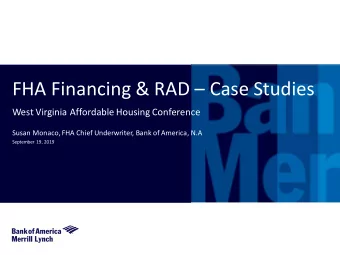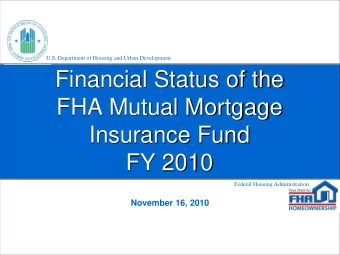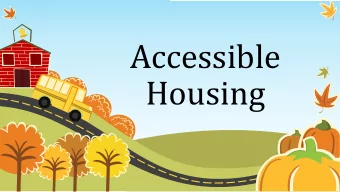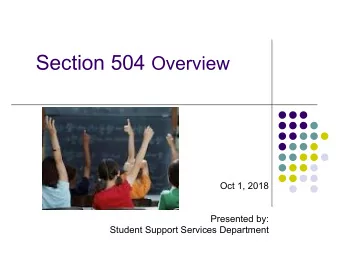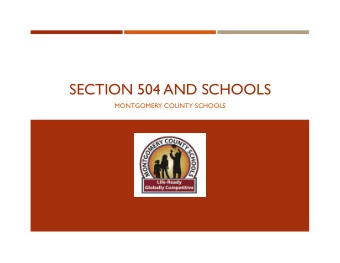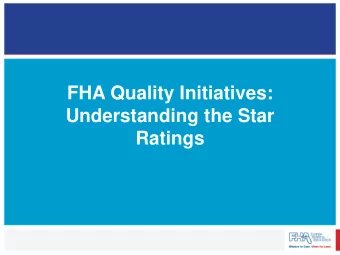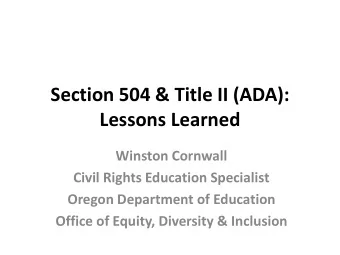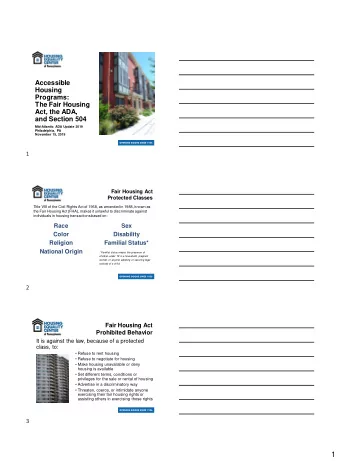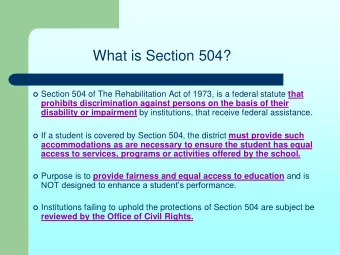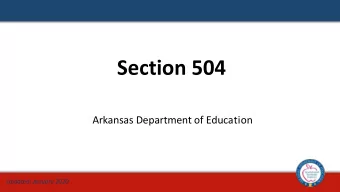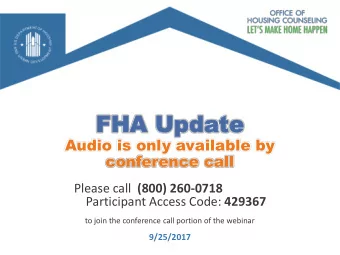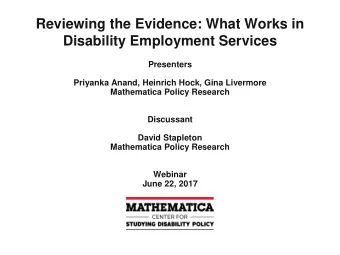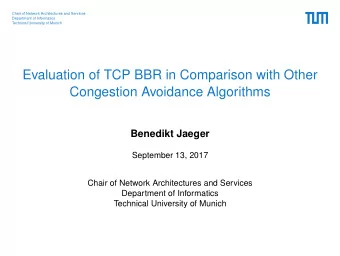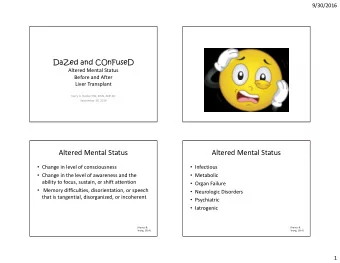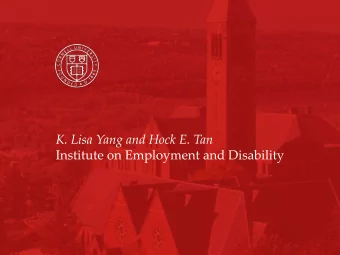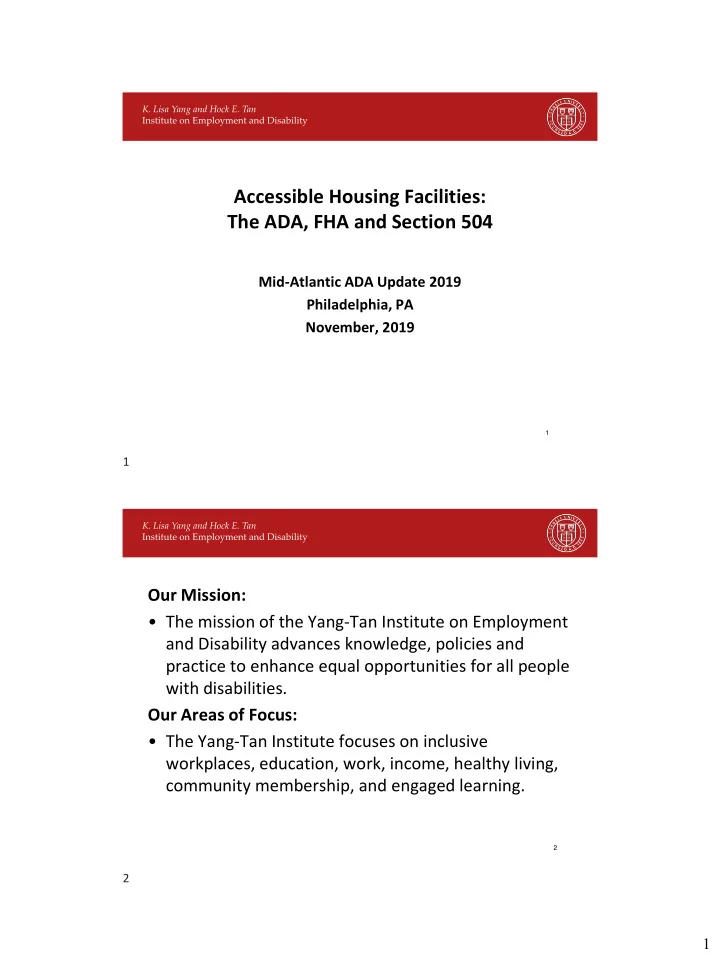
Accessible Housing Facilities: The ADA, FHA and Section 504 - PDF document
Accessible Housing Facilities: The ADA, FHA and Section 504 Mid-Atlantic ADA Update 2019 Philadelphia, PA November, 2019 1 1 Mission and Focus of the Yang-Tan Institute Our Mission: The mission of the Yang-Tan Institute on Employment
Accessible Housing Facilities: The ADA, FHA and Section 504 Mid-Atlantic ADA Update 2019 Philadelphia, PA November, 2019 1 1 Mission and Focus of the Yang-Tan Institute Our Mission: • The mission of the Yang-Tan Institute on Employment and Disability advances knowledge, policies and practice to enhance equal opportunities for all people with disabilities. Our Areas of Focus: • The Yang-Tan Institute focuses on inclusive workplaces, education, work, income, healthy living, community membership, and engaged learning. 2 2 1
Today’s Presenter Jennifer Perry Access Specialist Northeast ADA Center K. Lisa Yang and Hock E. Tan Institute on Employment and Disability ILR School Cornell University 800.949.4232 jlp359@cornell.edu northeastada@cornell.edu http://www.northeastada.org 3 3 Setting the Tone… • TA Caller: “Hi – I need some advice…my apartment manager said that I cannot have a reserved parking space closer to my unit, and I have a disability. Doesn’t the ADA prohibit that?” • TA Caller: “Hello – I’m an architect designing new private condos and I want to make sure I’m complying with the ADA in the bathroom and kitchen designs” 4 4 2
Fair Housing Trends in 2018 Infographic 5 5 FHA Complaint Data • As has been the case in past years, the majority of complaints from 2017 involved housing discrimination against people with disabilities. • There were 16,337 cases that involved discrimination against a person with disabilities, or 56.7 percent of all cases . • It should be noted that discrimination on the basis of disability is the easiest to detect as it usually involves a denial of a request for a reasonable accommodation or modification or because it involves a multi-family property that is not accessible in ways that violate the requirements of the Fair Housing Act • Source: 2018 National Fair Housing Alliance Trends Report • https://nationalfairhousing.org/wp-content/uploads/2018/04/NFHA-2018-Fair-Housing-Trends- Report_4-30-18.pdf 6 6 3
HUD Charges New York, Pennsylvania and Georgia- based Housing Design and Construction Professionals with Discriminating Against Persons with Disabilities Charge alleges New York condominium complex is not accessible to persons with disabilities September 16, 2019 • WASHINGTON - The U.S. Department of Housing and Urban Development announced today that it is charging housing professionals based in New York, Pennsylvania and Georgia with discrimination for failing to design and construct the 40-unit North 8 Condominium development in Brooklyn, New York, in accordance with the accessibility requirements of the Fair Housing Act. 7 7 Overview of Applicable Fair Housing Laws • The Americans with Disabilities Act of 1990 (ADA) • Fair Housing Act of 1968, as amended in 1988 (FHA) • Section 504 of The Rehabilitation Act of 1973 (504) 8 8 4
The Americans with Disabilities Act 9 9 The Americans with Disabilities Act (ADA) • Federal civil rights law passed in 1990 and amended in 2008 • Aims at achieving equal opportunity and equal access to community life for individuals with disabilities 10 10 5
Five Titles of the ADA Title I Employment Prohibits disability discrimination in all employment processes (EEOC Enforcement) Title II Accessibility in State/Local Government Physical and program accessibility in state/local govt. entities (U.S. DOJ/DOT Enforcement) Title III Accessibility in Public Accommodations Physical and program accessibility in restaurants, hotels, stores, places of business (U.S. DOJ Enforcement) Title IV Telecommunications Telephone and communications systems for the public (FCC/ U.S. DOJ Enforcement) Title V Miscellaneous Protection from retaliation 11 11 The Americans with Disabilities Act (ADA) (2) • Housing – and services – provided by state and local governments and their entities (Title II), including, but not limited to, correctional facilities, housing authorities, dorms, group homes and long term shelters - regardless of whether they receive federal funds • Public Accommodations that are open to the public, such as homeless shelters and motels (Title III) • Common areas of multi-family housing that are open to the public (Title III) 12 12 6
ADA Enforcement • The ADA gives people with disabilities the right to file lawsuits in Federal court and obtain Federal court orders to stop ADA violations. • People with disabilities can also file complaints with the U.S. DOJ, which can investigate and attempt to resolve the complaint – http://www.ada.gov. • The Justice Department is also authorized to file lawsuits in Federal court in cases of “general public importance” or where a “pattern or practice” of discrimination is alleged. 13 13 Section 504 of the Rehabilitation Act of 1973 14 14 7
Section 504 of The Rehabilitation Act of 1973 (Section 504) Section 504 states that "no qualified individual with a disability in the United States shall be excluded from, denied the benefits of, or be subjected to discrimination under" any program or activity that either receives Federal financial assistance or is conducted by any Executive agency or the United States Postal Service. 15 15 Section 504 of The Rehabilitation Act of 1973 (Section 504) (continued) Requirements common to these regulations include reasonable accommodation for employees with disabilities; program accessibility; effective communication with people who have hearing or vision disabilities; and accessible new construction and alterations . Each federal agency is responsible for enforcing its own regulations . Section 504 may also be enforced through private lawsuits. It is not necessary to file a complaint with a Federal agency or to receive a "right- to-sue" letter before going to court. 16 16 8
HUD Section 504 Regulations – Key Points Who are recipients of federal financial assistance? • The Section 504 regulations define “recipient” as any State or its political subdivision, any instrumentality of a state or its political subdivision, any public or private agency, institution organization, or other entity or any person to which federal financial assistance is extended for any program or activity directly or through another recipient, including any successor, assignee, or transferee of a recipient, but excluding the ultimate beneficiary of the assistance. 17 17 What do you think? • Would a non-profit developer of low income housing be considered a recipient of federal financial assistance ? • Would a public housing agency that receives HUD funding be covered by Section 504 in the operation of its Section 8 voucher program or activity? • Would a private landlord who accepts Section 8 tenant- based vouchers in payment for rent from a low-income individual be considered a recipient of federal financial assistance because of this payment? 18 18 9
Section 504 (HUD) Enforcement • HUD’s Office of Fair Housing and Equal Opportunity (FHEO) begins its complaint investigation process shortly after receiving a complaint. • https://www.hud.gov/program_offices/fair_housing_equal_opp/complaint-process • Generally, FHEO will either investigate the complaint or refer the complaint to another agency to investigate. • If the investigation shows that the law has been violated, HUD or the Department of Justice may take legal action to enforce the law. 19 19 The Fair Housing Amendments Act (FHAA) 20 20 10
The Fair Housing Amendments Act (FHAA) (2) The FHAA applies to all housing providers — private and public . The FHAA prohibits housing providers from discriminating against applicants or residents because of disability. In addition, the FHAA makes it unlawful to refuse “to make reasonable accommodations/modifications in rules, policies, practices, or services, when such accommodation may be necessary to afford such person equal opportunity to use and enjoy a dwelling.” 21 21 About the Fair Housing Act… The Fair Housing Act (FHA) was first passed in 1968, shortly after the assassination of Dr. Martin Luther King, and it prohibited discrimination based on race, color, religion and national origin. Discrimination based on sex was added in 1974. When the law was comprehensively amended in 1988, it was changed to include discrimination against people because of disability and because of familial status. 22 22 11
FHA PROTECTED CLASSES • RACE • COLOR • RELIGION • NATIONAL ORIGIN • SEX • FAMILIAL STATUS • DISABILITY 23 23 FHA Covered Individuals/Entities • Owners • Insurers • Managers • Developers/Builders • Architects • Homeowner’s Associations • Contractors • Lenders • Engineers • Real Estate Agents • Landscape Architects • Brokers • All Persons/Entities • Governments Involved with Residential Housing 24 24 12
FHA Enforcement • HUD’s Office of Fair Housing and Equal Opportunity (FHEO) begins its complaint investigation process shortly after receiving a complaint. • https://www.hud.gov/program_offices/fair_housing_equal_opp/complaint-process • Generally, FHEO will either investigate the complaint or refer the complaint to another agency to investigate. • If the investigation shows that the law has been violated, HUD or the Department of Justice may take legal action to enforce the law. 25 25 Now for the Technical Stuff… 26 26 13
Recommend
More recommend
Explore More Topics
Stay informed with curated content and fresh updates.
